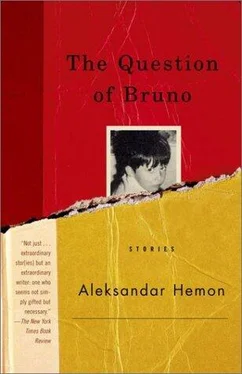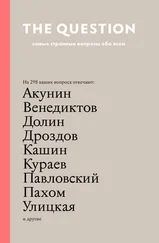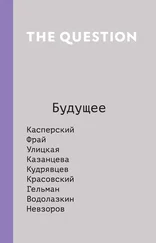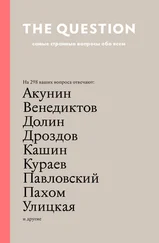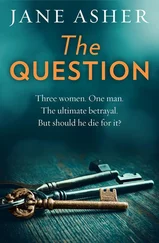I’m afraid this sentence was inescapable: the day of the Hemoniad arrived. A huge tent had been put up, above a long table. The stage for “the orchestra” had been built under the walnut tree in the center of the courtyard. Uncle Teodor, they say, was up at dawn, sitting on the porch and rehearsing the stories for the last time. I woke up (here we have a personal memory) to the incessant warbling of birds nesting under the roof. When I descended the stairs, I saw a pair of dancing headless chickens, trying to run away from something (but couldn’t because it was everywhere) their wings arrhythmically flapping, blood spurting out of their necks in decreasing streams. We had breakfast, sitting around the big table, passing panfuls of fried chicken livers and hearts, and platefuls of sliced tomatoes and pickles. “This,” said Uncle Teodor, “is the greatest day of my life.”
The Hemuns arrived all at once, with a fleet of shining new cars, like a colonizing army. They were uniformly overweight and spoke with a northern-Serbian drawl, which implied a life of affluent leisure. Nonetheless, everyone hugged each other, cheeks were smacked with kisses, hands were shaken ardently, and backs were slapped to the point of bruising. Uncle Teodor hollered: “Welcome, Hemuns!” and then proceeded from Hemun to Hemun, offering them his stump. He would turn his ear to each of them, asking: “And who are you?” and then memorized their voices.
The day went on in an atmosphere of general merriment and pleasant conversing. We have images, recorded on video, of the crowd in the tent, milling in a perpetual attempt to get closer to each other, like atoms forced to form a molecule, as everyone merged into one big body, with moist armpits and indestructible vocal chords. The band played all day, on and off, led by my cousin Ivan, who kept winking, over his heavily breathing accordion, at every woman under forty not directly related to him. When the band played old Ukrainian songs, the Hemuns sat grinning, confounded and embarrassed, for they could not understand a word. But everyone danced in whatever way they could, waltzing clumsily, their hands adhering to their partner’s bobbing sides and sweaty palms; or, their stage-fright temporarily cured by an infusion of a helpful beverage (beer was my choice of the courage-helper), they would dance kolomiyka , spinning at different speeds, from neck-breaking to mere circular trotting.
Around one o’clock, as the sun got stuck right above the walnut-tree top, my six aunts ascended the stage, having been introduced by Uncle Teodor, who recited their hypocoristic names like a poem: “Halyka, Malyka, Natalyka, Marenyka, Julyka, Filyka.” They sang a song about a young Ukrainian soldier who was being sent off to die in yet another battle for the freedom of Ukraine, who was doing what most of the soldiers in most of the Ukrainian songs did all the time: he was saying good-bye to his inconsolable mother and his faithful bride-to-be. They sang (my aunts) with their arms propped akimbo, serenely swaying and rubbing each other’s elbows. They looked like six variations of the same woman. Grandfather suddenly pricked up his ears, as if recognizing the song, but then he was retaken by the demons of slumber and succumbed with a grunt. Meanwhile, the soldier died (as we all had expected) and his faithful bride-to-be was about to be ravished by the same force that was to enslave Ukraine. “This song,” explained Uncle Teodor, after my aunts bowed, blushed, and scuttled off the stage, “is about the value of freedom and independence.”
Then the lunch was served and everyone sat around the long table, with Grandfather floating on the Lethe at the head of the table. The table was creaking under heaps of pork and chicken limbs. There were big-ear soup bowls, which were reverently passed around the table, as steam was enthusiastically gushing up, like smoke from a snoozy volcano. There were plates of green onions, stacked like timber, and tomato slices sunk in their own slobber. After the lunch, everyone became drowsy, descending from the mountains of meat to the lowlands of sleep. Snippets of conversation died off within instants, for no one’s blood was capable of reaching the brain. Grandfather was fast asleep and snoring, leaning on his sagely stick. He burped in his sleep and moved his tongue over his upper lip, touching the bottom of the mustache, and then in the opposite direction along the lower lip, for a whiff of pleasant taste had escaped the inferno of slow digestion and reached his palate. Finally, everything yielded to the stupor, and excited flies could land, after a long journey, on the continent abundant with meat and salad. They would comfortably sit on a slice of bread, greasing themselves to dazzling summer-fly glitter. Abruptly they would ascend, as if to check whether they could still fly. They would go down again, buzzing messages of festive pleasure to each other. Watching them, it occurred to me that they were our flies — Hemon flies — and therefore better than other flies, oblivious to their historical role.
On the videotape of the Hemoniad, the only document of the glorious festivity that reached the United States, this transcendental, cadaverous torpor is contained within three or four intense minutes of silence, the hum of the breeze in the microphone notwithstanding. It is important to note, however, that the flies disappeared in the process of converting the tape from PAL-SECAM to NTSC.
Then Uncle Teodor was snatched out of his wheezing tranquillity and led to the stage, where he was placed into a chair. The level of consciousness abruptly rose around the table. Uncle Teodor said: “I will tell you stories now, because it is important to know one’s own history. If you know the stories, just sit quiet and listen — we have people who don’t know them.” The Hemuns — people who didn’t know the stories — fidgeted and glanced timorously at each other, for they suspected that the stories would present them as treacherous and weak people. But Uncle Teodor had different intentions. He began with the Hemons of The Iliad , their doughty feats and their contribution to the burning of Troy. Then he talked about the Hemon who almost married Antigone, the most beautiful woman of the ancient world. He barely touched on the Hemon who was Aeneas’ sidekick and who founded the Roman empire with him. He talked about Hemons defending the European civilization from a deluge of barbarian Slavic marauders. Then he skipped a number of centuries and nearly brought tears to everyone’s eyes talking about the murderous retreat and Alexandre’s travails and the horrors of Russian winter. He told us of Alexandre’s hallucinations: armies of headless men, marching in circles, and he trying to escape a gigantic ax that strived to decapitate him, until he fell down—“he didn’t feel the snap, but he felt blood spurting and the cold slowly gnawing his limbs.” And then he was saved by our Ur-Mother Marija. As Uncle Teodor was narrating their budding love and Alexandre’s recovery, Grandfather burst to the surface of the day, looked around in genuine astonishment and asked me, since I was sitting next to him:
“Who are these people?”
I said: “They’re your tribe, Grandpa.”
“I’ve never seen them in my life.”
“Yes, you have, Grandpa.”
“And who are you?”
“I’m one of your grandchildren.”
“I’ve never seen you in my life.”
“Well, now you can see me.”
“Where are we?”
“We’re home, Grandpa.”
That seemed to satisfy him, so he dropped his head to his chest, and was back in the boat crossing the Lethe. In the meantime, Uncle Teodor got to Alexandre and Marija’s progeny. The Hemons of the mid-nineteenth century were invariably bright and dexterous and hard-working, even though they perennially suffered from Polish and Russian injustice, plus tuberculosis and scurvy. Moreover, women kept miscarrying, while men kept falling off trees and being gored by disobedient cattle. “And yet we survived!” exclaimed Uncle Teodor. He went on to tell a story I had never heard before, a story about the ancestor who had gone to America to become a rich man, and when he became a rich man he returned to his village. He built a beautiful house and did nothing but court rural virgins, receive and drink with guests. One of his drinking acquaintances, probably the devil incarnate, dared him to spend a night on the local graveyard, which was known to be haunted by the village Jews massacred in a pogrom. He bet his whole estate that he would spend the night and he did, but he met the rose-fingered dawn with his hair completely white and his hands unstoppably shaking. He never told anyone what he had heard or seen, but the next day he gave all he had to the rabbi of the few remaining Jews so he could build a home for the wandering spirits. He was deemed insane after that by his relatives, who had just gotten used to being members of a wealthy family, and who claimed that it was Jewish magic that cast a spell on their dear cousin. One day he disappeared, and no one ever saw him again. Uncle Teodor claimed that he had gone back to America, and that we probably have some American cousins. As we imagined our half-mad white-haired cousin sailing toward the Statue of Liberty, coffee was served. We sipped strong tarrish liquid from a demitasse, without really noticing that Uncle Teodor had omitted the second half of the nineteenth century (probably because some of our forefathers were prone to pogrom fever) and began telling the narrative about the exodus to Bosnia.
Читать дальше
